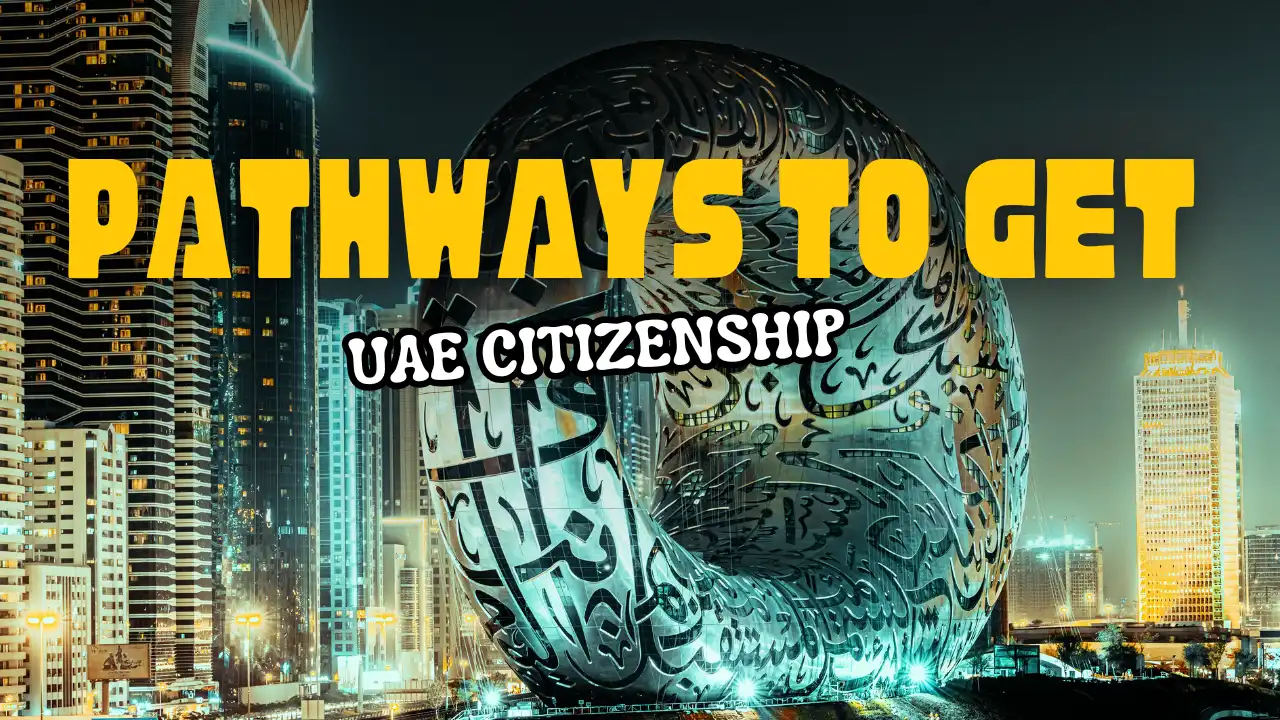Dreaming of holding a UAE passport? You’re not alone. From world-class infrastructure to zero income tax, the Emirates has become a magnet for global talent and investors. But unlike many countries, UAE citizenship is rarely granted, and that’s exactly what makes it so sought after.
Whether you’re a seasoned professional, a high-net-worth investor, or someone with deep regional ties, here’s a clear guide to how you might become a citizen of the United Arab Emirates.
How to Get UAE Citizenship
To get UAE citizenship, you must be nominated by the government or the royal court. You cannot apply directly. The 2021 amendment to the nationality law allows select foreigners, such as investors, doctors, scientists, intellectuals, and skilled talents, to receive Emirati citizenship by presidential decree, provided they meet strict conditions and swear allegiance.
Key eligibility categories include:
-
Investors: Must own property in the UAE.
-
Doctors & Specialists: Must be experts in a unique scientific field.
-
Scientists & Researchers: Must have at least 10 years’ experience and active research.
-
Artists & Inventors: Must have patents or international awards.
Dual citizenship is now allowed, but only with approval.
Overview of UAE Citizenship Laws
The Legal Framework
UAE citizenship is governed by Federal Law No. 17 of 1972, later amended in 2021 to allow for dual citizenship under exceptional circumstances. According to the Official UAE Government Portal, Emirati nationality is governed by Federal Law No. 17 of 1972, and a 2021 amendment allows for dual citizenship under specific conditions. Unlike many countries that follow jus soli (citizenship by birthplace), the UAE primarily adheres to jus sanguinis, meaning citizenship is passed through Emirati parentage, particularly the father. This amendment targets select categories such as investors, doctors, scientists, and creatives.
The federal structure of the UAE means that naturalisation decisions are made not only at the national level but also through Rulers’ Courts, the Cabinet, or Executive Councils, depending on the applicant’s case.
Key Amendments and Modernisation
In 2021, the UAE introduced sweeping changes aimed at attracting global talent. These reforms allowed selected foreign nationals—particularly investors, doctors, scientists, and creatives—to be granted citizenship while retaining their original nationality. This move was widely interpreted as part of a larger strategy to deepen the country’s human capital and innovation ecosystem.
A Rare But Strategic Offering
Despite these changes, it’s important to understand that UAE citizenship is not an application-based process. You cannot simply fill out a form and apply. Instead, candidates are nominated by Emirati officials, evaluated for their long-term contribution potential, and then approved on a discretionary basis.
Several years ago, while advising a multinational firm expanding into the UAE, I worked with a senior researcher who had spent over two decades contributing to the region’s healthcare innovation. Despite holding a Golden Visa and publishing award-winning research under the UAE flag, his citizenship was only considered after direct sponsorship from a government advisory body. Even then, the process took more than two years and included multiple layers of background checks, interviews, and formal assessments.
That experience showed me just how exclusive and symbolic UAE citizenship is. It’s not just a legal status—it’s a recognition of alignment with national priorities.
Who Can Qualify for UAE Citizenship
A Selective and Stratified System
The United Arab Emirates does not operate a blanket naturalisation policy. Instead, citizenship is extended selectively to individuals who fall into strategically valuable categories. These include:
- Investors
- Doctors and specialists
- Inventors
- Scientists and intellectuals
- Artists and creatives
- Individuals with Emirati heritage
- Spouses of Emirati citizens
Each category has its own set of eligibility criteria, and all require a demonstrated long-term commitment to the UAE.
Investors
High-net-worth individuals may qualify if they own property or businesses in the UAE. While no official figure guarantees citizenship, past announcements suggest a threshold of AED 10 million or more in real estate or economic investment. A nomination usually follows sustained contributions to the national economy.
Doctors, Specialists, and Scientists
Applicants must be recognized experts in fields deemed critical to the country’s future—like oncology, virology, AI, or sustainability. Typically, this means holding a PhD degree and having at least 10 years of experience, along with scientific contributions or awards recognised globally or regionally.
Inventors and Innovators
This group must hold at least one patent approved by the UAE Ministry of Economy or a similarly recognized body. The patent must have clear economic or technological relevance to the country.
Intellectuals, Artists, and Creatives
This category covers authors, artists, and other creatives with international acclaim or cultural impact, particularly if their work reflects or contributes to the UAE’s cultural identity. Endorsements from official Emirati cultural institutions are often required.
Spouses of Emirati Citizens
Foreign women married to Emirati men may be granted citizenship after 7 years of marriage (if they have children) or 10 years without children, provided they maintain a clean criminal record and renounce their original citizenship, unless dual citizenship is explicitly permitted.
Individuals of Emirati Descent
Persons born to an Emirati father (or, in some cases, a UAE-born mother) are eligible for citizenship by birthright or heritage, but they must undergo registration and vetting processes if the lineage has not been previously documented.
Each of these paths is highly competitive and involves nomination from UAE-based entities, extensive documentation, and official review. Citizenship is ultimately viewed not as a transactional right, but a national honor extended to those who reflect the UAE’s vision and values.
5 Legal Pathways to Get UAE Citizenship in 2025 (With Requirements)
1. Citizenship by Descent (Heritage Pathway)
Legal Basis and Lineage Rights
Citizenship by descent in the UAE is rooted in Federal Law No. 17 of 1972, which recognises the principle of jus sanguinis, the right of blood. In practical terms, this means that citizenship is passed down through Emirati parentage, rather than birthplace. Children born to an Emirati father automatically acquire UAE citizenship at birth, regardless of where they are born. This is one of the most straightforward pathways, though it still requires registration and verification.
For children of Emirati mothers and foreign fathers, the pathway is more complex. While reforms have been made to allow these children to apply for citizenship, the process is not automatic. It often involves proof of residency, language ability, good conduct, and sometimes reaching a certain age before citizenship is granted. This policy is part of ongoing efforts to align legal structures with modern family dynamics, especially in a society where intermarriage is increasingly common.
Gender-Specific Provisions
Historically, UAE citizenship laws have reflected patrilineal transmission, meaning citizenship is inherited from the father. However, recent legal updates show a shift toward gender equality, with the government announcing in recent years that children of Emirati mothers can apply for citizenship under eased requirements. This still stops short of full parity, but represents a clear trend toward inclusion.
Here’s a comparative breakdown of how citizenship by descent applies, depending on the parents’ nationality:
Parental Citizenship and UAE Citizenship Eligibility
| Parental Citizenship | Automatic UAE Citizenship | Special Conditions |
| Emirati father | Yes | Registration required |
| Emirati mother only | No | Application required; subject to approval |
| Both parents Emirati | Yes | At birth, no conditions |
| Foreign parents | No | Not eligible through descent |
This pathway, while more structured than others, is still underpinned by a strong vetting process. Documentation like birth certificates, parental ID, and proof of lineage must be submitted for official review. In all cases, registration with the Federal Authority for Identity and Citizenship is required to formalise the status.
2. Citizenship Through Marriage
Pathway for Foreign Spouses
The UAE allows foreign spouses, specifically women married to Emirati men, to apply for citizenship, provided they meet certain residency and duration conditions. According to the current legal framework, the foreign wife must be married to the Emirati national for at least seven years if the couple has children, or ten years without children. During this time, she must demonstrate continuous cohabitation in the UAE and maintain a clean criminal record.
The marriage must also be legally registered with UAE authorities, and the couple’s relationship must be recognised as valid and stable. Importantly, the process is not automatic; it begins with a formal application followed by investigation and approval from the Federal Authority for Identity and Citizenship. In many cases, a successful application depends not only on the length of marriage but also on how well the applicant is integrated into Emirati culture.
Gender Limitations and Legal Disparity
Currently, the reverse, foreign men married to Emirati women, are not eligible for citizenship through marriage. While children of these unions may apply under specific conditions (as covered in the descent section), the husband remains a foreign national with no fast-track pathway to citizenship. This legal asymmetry has sparked discussion in legal and human rights circles, but no reforms have yet closed the gender gap in this aspect of the citizenship law.
This means that women benefit from a more defined path to Emirati citizenship through marital ties, while men in similar situations must explore other routes, typically through long-term residence or professional merit.
Cultural Integration and Allegiance
In addition to residency duration and legal marriage, applicants are also expected to show cultural and linguistic integration. This includes a basic proficiency in Arabic, respect for local traditions, and good standing within the community. Upon approval, the applicant must take an oath of allegiance to the UAE, pledging loyalty to the nation and agreeing to abide by its laws and values.
The process reflects the UAE’s broader goal: to grant citizenship not merely as a legal status, but as a social contract rooted in commitment, loyalty, and contribution to the nation’s identity.
3, Citizenship by Naturalisation
Naturalisation in the UAE is an extended process reserved for select long-term residents who have lived in the country for at least 30 consecutive years, or 20 years if residency began before 1972. Applicants must demonstrate fluency in Arabic, financial stability, continuous lawful residence, and a clean criminal record. While this path exists in law, it is rarely used in practice and almost always requires endorsement by a ruling authority or federal body.
4. Citizenship via Investment or Real Estate
Economic Entry into Citizenship Consideration
The UAE does not offer a direct citizenship-by-investment program like some countries do. However, significant investors may be considered for citizenship under the “exceptional merit” clause, especially when their financial activity aligns with national development goals. In particular, high-value real estate ownership or business investments are viewed favorably, provided they are sustained and verifiable over time.
Property-Based Eligibility Signals
One of the most notable routes is through real estate investment, often seen in conjunction with the Golden Visa program. While the Golden Visa itself does not confer citizenship, owning properties of substantial value—typically starting from AED 10 million—can position an individual for future nomination, especially if their business contributions extend beyond passive ownership. The investment must be held for several years, and the property should not be leveraged through loans.
Indirect Nature of Investment-Based Citizenship
It’s important to stress that these routes do not guarantee naturalisation. The process is entirely discretionary, and investors must still meet other non-financial conditions like good conduct, language skills, and national loyalty. In most cases, the path begins with a long-term residency visa, progresses to a Golden Visa, and only after years of proven value may result in a citizenship nomination, if at all.
Typical Investment Thresholds Considered
- AED 10 million+ in real estate is generally seen as the minimum benchmark
- AED 1 million+ qualifies for a 5-year Golden Visa (not citizenship)
- AED 750,000 may qualify for a 2-year property-linked residence visa
- Investment must be held outright, not mortgaged or under lien
- Contributions to UAE-registered businesses or innovation sectors may also be evaluated
5. Golden Visa vs. UAE Citizenship
The UAE Golden Visa is a long-term residency permit, not a path to automatic citizenship. Introduced to attract skilled professionals, investors, and entrepreneurs, the Golden Visa allows foreign nationals to live, work, and study in the UAE for 5 to 10 years, renewable indefinitely. Holders enjoy many of the same benefits as citizens, including business ownership without a local sponsor and access to UAE banks, but they remain foreign nationals with no political rights or passport privileges.
In contrast, UAE citizenship is far more exclusive and permanent. It includes full rights such as voting in designated advisory councils (where applicable), holding an Emirati passport, and greater legal protections. However, while the Golden Visa can act as a stepping stone, it does not by itself lead to citizenship. Only those who make exceptional contributions, financially, scientifically, or culturally, may be nominated for citizenship, even after years of holding a Golden Visa. In this way, the two programs serve different purposes: one for residency and stability, the other for national inclusion and identity.
Required Documentation and Oath Process
Core Requirements for Eligibility Verification
Because UAE citizenship is granted by nomination rather than application, the documentation process is initiated only after a candidate has been recommended by an official Emirati entity, such as the Cabinet, a Ruler’s Court, or the Executive Council. Once under consideration, applicants must submit a comprehensive dossier that validates their identity, qualifications, achievements, and legal standing.
Required documents generally include:
- Valid passport and residency permit
- Birth certificate and family book (for heritage or marriage-based cases)
- Marriage certificate (if applicable)
- Proof of continuous legal residence (entry/exit records)
- Educational degrees (attested by UAE authorities)
- Professional licenses or patents (for experts/inventors)
- Proof of real estate or business investments
- Letters of recommendation from recognised UAE institutions
- Criminal background clearance
- Medical fitness certificate
Each document must be certified, translated into Arabic, and attested by relevant ministries. In some cases, additional scrutiny, such as interviews or national security reviews—may apply, especially for those entering through merit or investment channels.
The Allegiance and Finalisation Ceremony
If the application is approved, the final step is the Oath of Allegiance. This formal pledge binds the new citizen to respect and uphold UAE laws, values, and sovereignty. The oath is administered by an authorized legal or governmental body, and citizenship is granted only after it is successfully taken. In some cases, the UAE may allow the individual to retain their original nationality, in line with recent reforms permitting dual citizenship under approved circumstances.
This final step is more than ceremonial—it represents a moral and legal contract with the nation, affirming loyalty, contribution, and identity as part of the Emirati community.
Key Challenges and Limitations
Exclusivity Over Accessibility
One of the most significant challenges of obtaining UAE citizenship is its highly selective nature. There is no open application process, public scoring system, or fixed timeline. Even individuals who meet all technical qualifications—such as holding a PhD, investing millions, or having decades of residency—may never receive a nomination. Citizenship is viewed not as a right, but as a symbolic recognition of national alignment and long-term value to the country.
Legal Ambiguity and Administrative Discretion
Unlike immigration systems in countries like Canada or Portugal, where pathways to citizenship are codified and procedural, the UAE model relies heavily on government discretion. There is minimal public transparency about approval criteria, decision-making bodies, or the number of citizenships granted each year. This makes the process unpredictable and sometimes opaque, even for well-qualified candidates. Delays, silence, or rejection without explanation are not uncommon.
Dual Citizenship Is Not Universally Guaranteed
Although the UAE amended its laws in 2021 to allow dual citizenship, this provision is only extended to specific, approved categories. Most applicants must be willing to renounce their existing nationality unless explicitly permitted to retain it. This creates a dilemma for individuals from countries that don’t recognise dual nationality, or whose home governments may restrict certain types of foreign allegiance.
Ready to Explore Life in the UAE?
Whether you’re aiming for long-term residency or have ambitions toward eventual citizenship, understanding your options is the first step. At The Open World, we guide professionals, investors, and families through the evolving pathways of UAE immigration and residency.
Start your personalised journey today at The Open World and discover what it takes to build your future in one of the world’s most dynamic nations.
Final Thoughts
UAE citizenship remains one of the most exclusive nationalities in the world, granted not through application but through recognition of exceptional value and loyalty. While multiple pathways exist, heritage, marriage, naturalisation, investment, or merit, they are governed by strict conditions and discretionary approvals.
For most, the more accessible path is through long-term residence via programs like the Golden Visa, which offers stability and many practical benefits without the complexities of citizenship. Still, for those who align with the UAE’s strategic priorities and cultural ethos, the possibility, though rare, is real.
Ultimately, UAE citizenship is more than just a legal status. It’s an invitation into a national identity, extended only to those whose presence shapes the country’s future.
FAQs on How to Get UAE Citizenship
Can foreigners apply directly for UAE citizenship?
No. UAE citizenship is granted by government nomination only. There is no direct application process for foreigners.
How long do you need to live in the UAE to be eligible for naturalisation?
At least 30 consecutive years of lawful residence are typically required, or 20 years if residency began before 1972.
Can I get UAE citizenship through investment?
Not directly. While large investments (e.g., AED 10 million+) may lead to long-term residency or nomination consideration, they do not guarantee citizenship.
Is dual citizenship allowed in the UAE?
Yes, since 2021, the UAE has allowed dual citizenship in select cases, but only for individuals approved under specific categories like investors or scientists.
Can the spouse of an Emirati get citizenship?
Yes, a foreign woman married to an Emirati man may apply after 7 years of marriage (with children) or 10 years (without). The reverse does not apply.




